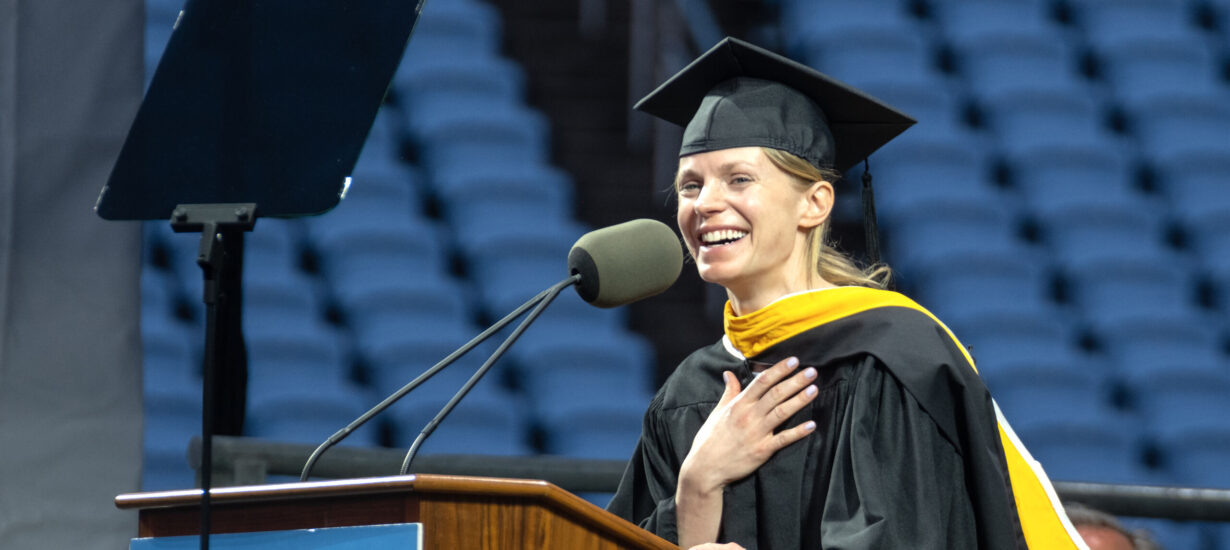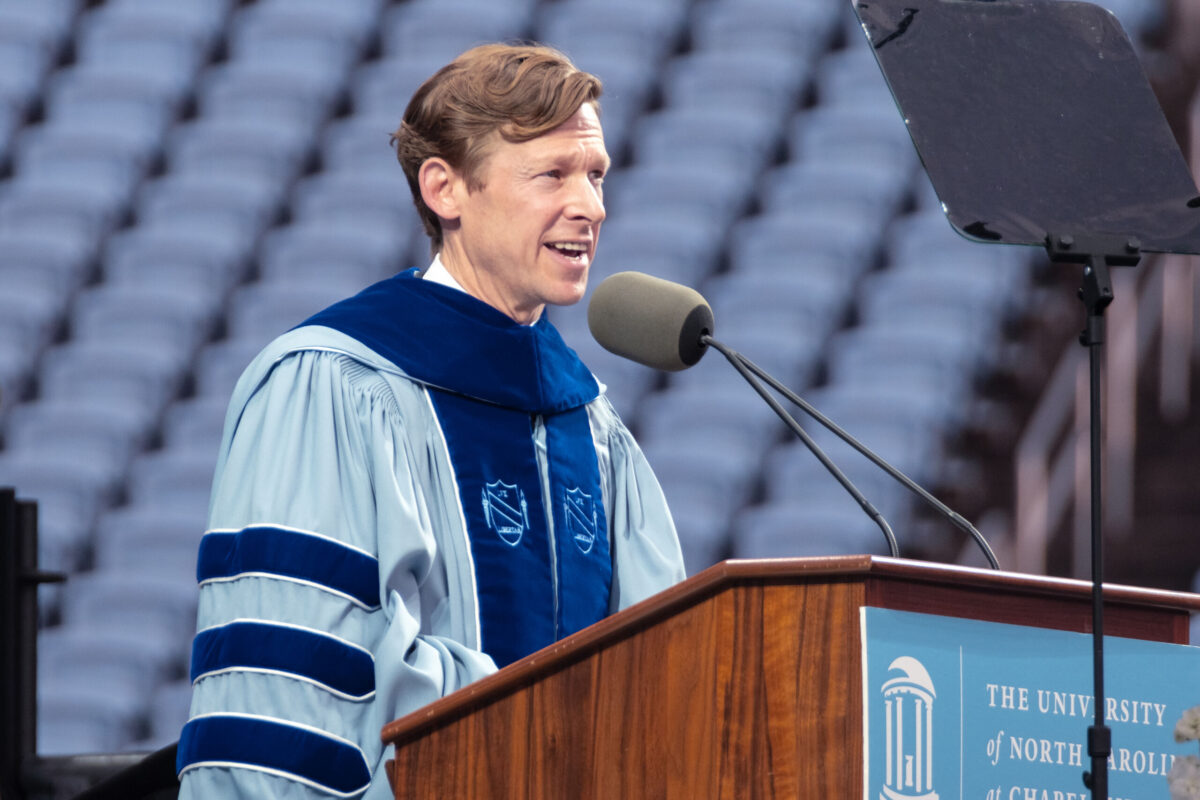Astronaut To Graduates: “Just Start Walking”

An astronaut who in August will lead a six-month mission to the International Space Station told graduates May 11 they should determine their definition of great things, success and fulfillment.
“Carolina, I know you can accomplish great things because you already have and you don’t need my advice,” said Zena Cardman ’10 (MS ’14), the Commencement keynote speaker. “I will only suggest that the definition of great things, of success, of fulfillment is entirely up to you, and the path won’t always be obvious. The best journeys begin at Carolina, and mine did, too.”
An estimated 4,265 undergraduates, 1,530 master’s degree candidates and 884 doctoral students, along with tens of thousands of family members and friends in the stands, packed into Kenan Stadium during the evening under the lights. In a change from past years, Commencement was held on Saturday, not Sunday, Mother’s Day.
Cardman, who got her start as an astronaut when NASA selected her in 2017 from a pool of 18,000 applicants, told graduates it was always her goal to travel to space, but she had to be patient. Cardman said her first assignment was that of a backup crew member to another woman astronaut. Some of her well-intentioned friends joked about how Cardman could intentionally work to disqualify the woman so Cardman could take her place — a notion she dismissed out of hand. “If your goal requires cutting down someone else to get there, you need a different goal,” Cardman said to applause.

The University of North Carolina at Chapel Hill celebrated the graduation of over 6,700 students at the annual Spring Commencement. (Photo: UNC/Jon Gardiner ’98)
She discussed training at NASA’s National Outdoor Leadership School, where expeditionary missions are practiced in the wilderness. The training occurred in Utah, which Cardman said is a tough environment for heavy backpacking. “The days were full of stories and laughter and also blisters and low morale,” she said. “Water is not abundant without hiking or rappelling down into the canyons, and so we mostly scooped rain water from shallow, silty puddles … using the lids of our water bottles as ladles.”
Cardman’s crew also trained in December in Wyoming, sleeping in shelters carved with shovels out of large piles of snow and cooking dinner on countertops made of snow. They transported their belongings on sleds attached to their hips with harnesses, and at night they shared stories around a campfire.
“Physically, the hardest job is up front, so we took turns breaking trail,” Cardman said. “Sometimes the ground was flat, and I could go for a long time at the front of the line. Sometimes the terrain was steep, and I could barely manage breaking trail for one hill. The real work happened at night around the campfire. … In this setting, breaking trail is the choice to open up to each other to address conflict, misunderstandings or insecurities, to share praise, to ask questions and to listen.”
During these moments, Cardman said, crew members inspired each other and learned about the intangible baggage they carried with them.
Cardman said it would have been a good accomplishment for her team to climb a mountain, but in actuality despite how hard they labored, they trekked only a few miles. “It was never about the distance or the altitude,” she said. “It was about building trust and a connection. I’m so grateful that I got to know my crew in that setting, and now I get to fly into space with my friends and my heroes.”
Cardman told graduates the most important thing they do may never appear on a resume, and it may be thankless. “You all have so much possibility ahead, a huge field of untouched snow and unlimited paths to take,” she said. “If you want to be a trailblazer, just start walking. You don’t actually have to know where you’re going if you know who you’re doing it for. The most transformative journeys often don’t take you very far at all.”

Interim Chancellor Lee Roberts presided over the ceremony that honored an estimated 4,265 undergraduates, 1,530 master’s degree candidates and 884 doctoral students. (Photo: UNC/Jon Gardiner ’98)
Interim Chancellor Lee Roberts opened the ceremonies by commending the graduates for persevering, particularly given the many obstacles they faced even before arriving on campus as first-year students.
“Every graduating class deserves a day of celebration and reflection, and this one more than most,” Roberts said. “Many of you missed out on high school graduation and on the rites and recognition that normally mark the transition into college. You bore the brunt of the pandemic lockdowns, and then, you found ways to rekindle public life at Carolina after it was brought to a standstill.”
Veronica Flaspoehler, president of Carolina Alumni, told the graduates their degree isn’t the only life-changing, valuable accomplishment they’re taking from Carolina that’s likely to open doors and shape their lives for the better.
“Think of all the friends, the mentors, the teammates and classmates, the networks and relationships you’ve built during your time here,” Flaspoehler said. “Those late nights of studying mattered a lot, but so, too, did those late nights of talking, dancing, flirting, arguing and getting to know the people going on this ride with you. All of those people, the ones you see here today, and the hundreds of thousands more who stood right here where you’re sitting right now, are part of a remarkable community of Tar Heels.”
— Laurie D. Willis ’86
Processing 50 Years Later

The Commencement ceremony began with members of the class of 1974 — celebrating their 50th reunion — processing into Kenan Stadium. (Photo: Carolina Alumni/Cory Dinkel)
The Commencement ceremony began with members of the class of 1974 — celebrating their 50th reunion — processing into Kenan Stadium to Blue Swede’s cover of “Hooked on a Feeling,” which topped the U.S. charts at No. 1 in 1974.
The processional was part of Spring Reunions Weekend held May 8–11 and sponsored by Carolina Alumni. It included a coffee reception for milestone classes of 1959, 1964 and 1969, enrichment sessions with bestselling author John Grisham and members of the men’s basketball team that beat Duke in 1974 after erasing an 8-point deficit in the final 17 seconds, a guided tour of the Carolina Basketball Museum and a reception and dance.
As members of the class of 1974 listened to speeches while the sun dropped behind the stadium, some likely reminisced about their graduation day 50 years ago when heavy rains forced them inside a hot, muggy Carmichael Auditorium.
Mike Schoedler ’74 of Durham didn’t attend his commencement ceremony 50 years ago. “I’ve been thinking about coming back and doing this for quite a while now,” Schoedler said. “It’s very emotional to be here to take part in this, and I’m really happy to be back.”
Ellanor Graves ’74 (’76 MEd), class vice president, referenced the COVID-19 pandemic and said she considered it a gift to be alive to march again with her classmates 50 years later.
Charles Blackwell ’74 didn’t attend commencement five decades ago. Just minutes before he and his classmates walked onto the football field, standing in the dark tunnel leading to the gridiron, Blackwell talked excitedly about the chance to finally process. “I’m very grateful and thankful to the University for giving us the opportunity,” he said.
